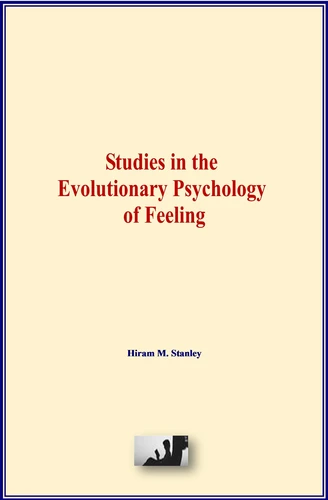Studies in the Evolutionary Psychology of Feeling
Par :Formats :
Disponible dans votre compte client Decitre ou Furet du Nord dès validation de votre commande. Le format Multi-format est :
- Pour les liseuses autres que Vivlio, vous devez utiliser le logiciel Adobe Digital Edition. Non compatible avec la lecture sur les liseuses Kindle, Remarkable et Sony
 , qui est-ce ?
, qui est-ce ?Notre partenaire de plateforme de lecture numérique où vous retrouverez l'ensemble de vos ebooks gratuitement
Pour en savoir plus sur nos ebooks, consultez notre aide en ligne ici
- FormatMulti-format
- ISBN978-2-36659-797-4
- EAN9782366597974
- Date de parution10/10/2019
- Protection num.NC
- Infos supplémentairesMulti-format incluant ePub avec ...
- ÉditeurLM Publishers
Résumé
It is now something more than a century since the general division of psychic phenomena into intellect, feeling and will, first came into repute, but still some psychologists of note do not agree to this fundamental classification, but would unite feeling and will in a single order. As to the subdivisions of feeling and will we are confessedly wholly at sea. In intellect it is only on the lower side, sensation and perception, that anything of great scientific value has been accomplished; and even now it cannot be said that the classes of sensation have been marked off with perfect certainty.
In the higher range of intellect psychology can do scarcely more than accept some ready-made divisions from common observation and logic. And if so little has been settled in the comparatively simple work of a descriptive classification of the facts of mind, we may be assured that still less has been accomplished toward a scientific consensus for the laws of mind. Weber's law alone seems to stand on any secure basis of experiment, but its range and meaning are still far from being determined.
Even the laws of the association of ideas are still the subjects of endless controversy. Also in method there is manifestly the greatest disagreement. The physiological and introspective schools each magnify their own methods, sometimes so far as to discredit all others. Physiological method has won for itself a certain standing, indeed, but just what are its limitations is still far from being settled...
In the higher range of intellect psychology can do scarcely more than accept some ready-made divisions from common observation and logic. And if so little has been settled in the comparatively simple work of a descriptive classification of the facts of mind, we may be assured that still less has been accomplished toward a scientific consensus for the laws of mind. Weber's law alone seems to stand on any secure basis of experiment, but its range and meaning are still far from being determined.
Even the laws of the association of ideas are still the subjects of endless controversy. Also in method there is manifestly the greatest disagreement. The physiological and introspective schools each magnify their own methods, sometimes so far as to discredit all others. Physiological method has won for itself a certain standing, indeed, but just what are its limitations is still far from being settled...
It is now something more than a century since the general division of psychic phenomena into intellect, feeling and will, first came into repute, but still some psychologists of note do not agree to this fundamental classification, but would unite feeling and will in a single order. As to the subdivisions of feeling and will we are confessedly wholly at sea. In intellect it is only on the lower side, sensation and perception, that anything of great scientific value has been accomplished; and even now it cannot be said that the classes of sensation have been marked off with perfect certainty.
In the higher range of intellect psychology can do scarcely more than accept some ready-made divisions from common observation and logic. And if so little has been settled in the comparatively simple work of a descriptive classification of the facts of mind, we may be assured that still less has been accomplished toward a scientific consensus for the laws of mind. Weber's law alone seems to stand on any secure basis of experiment, but its range and meaning are still far from being determined.
Even the laws of the association of ideas are still the subjects of endless controversy. Also in method there is manifestly the greatest disagreement. The physiological and introspective schools each magnify their own methods, sometimes so far as to discredit all others. Physiological method has won for itself a certain standing, indeed, but just what are its limitations is still far from being settled...
In the higher range of intellect psychology can do scarcely more than accept some ready-made divisions from common observation and logic. And if so little has been settled in the comparatively simple work of a descriptive classification of the facts of mind, we may be assured that still less has been accomplished toward a scientific consensus for the laws of mind. Weber's law alone seems to stand on any secure basis of experiment, but its range and meaning are still far from being determined.
Even the laws of the association of ideas are still the subjects of endless controversy. Also in method there is manifestly the greatest disagreement. The physiological and introspective schools each magnify their own methods, sometimes so far as to discredit all others. Physiological method has won for itself a certain standing, indeed, but just what are its limitations is still far from being settled...



